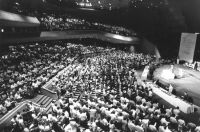The Grand Design - New answers to the Ultimate Questions of Life
[Or 'Old non-answers to the Ultimate Questions of Life']
It hit the headlines with, "'GOD IS DEAD,' says Prof. Hawkins." So is philosophy, apparently: Hawkins wants science to take over. Except that science deals with observation and experimentation, and he's talking about the beginning of the universe, which no scientist observed, and which cannot be repeated in a controlled experiment. So he does do philosophy after all, but badly.
A: All swans I have seen are white
Therefore (by induction) all swans are white
= the law of this universe is such that swans are white
The law of this universe makes swans white
Hm?
Scientific 'laws' are simply induction from observation. In other words, a 'law'of science merely describes what we see. It doesn't do anything, any more than the law of the jungle makes a snake eat a monkey. It describes the usual state of affairs.
So for Hawkins and Mlodinow to imply that the law of gravity produced the big bang, is a severe category and logical error.
As for the ultimate questions of life... well, you don't get the right answers if you can't think of better questions: 42, anyone?
A while ago, an Aussie paper reported:
"...not only are other planets likely to exist, but whole other universes, known collectively as the multiverse, are too, says Professor Hawking. If God's intention was to create mankind, then these many untouchable worlds would surely be redundant, he suggests."
Amen - God was not creating the universe just for the sake of man, with a gazillion redundant side projects that didn't quite work out, and one functional planet!
No, the God who communicated himself in Christ in all the Bible made the universe for himself, in an outward explosion of inter-trinitarian love. 'by [Christ]... through him, and for him.' The humanistic god-of-the-gaps we invent to be as man-centred as we are, is dead. Long live Christ, who is before all things, and in whom all things hold together!
 In the final weeks of preparation for The Third Lausanne Congress on World Evangelization, I came across this: John Piper's reflections of 20 years ago, of attending Lausanne II, in Manila. They moved me to tears and reminded me of the impact that congress had on churches, pastors and missions across the world.
In the final weeks of preparation for The Third Lausanne Congress on World Evangelization, I came across this: John Piper's reflections of 20 years ago, of attending Lausanne II, in Manila. They moved me to tears and reminded me of the impact that congress had on churches, pastors and missions across the world.  We pray it will resound in inspiration and shaping of ministries such as DesiringGod, and thousands lesser known, to the ends of the globe. Not just that more would be busy for Jesus, but that our Lord would use it to hasten his return in glory.
We pray it will resound in inspiration and shaping of ministries such as DesiringGod, and thousands lesser known, to the ends of the globe. Not just that more would be busy for Jesus, but that our Lord would use it to hasten his return in glory.






